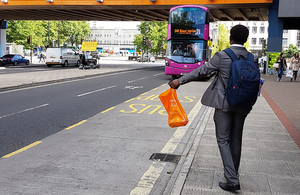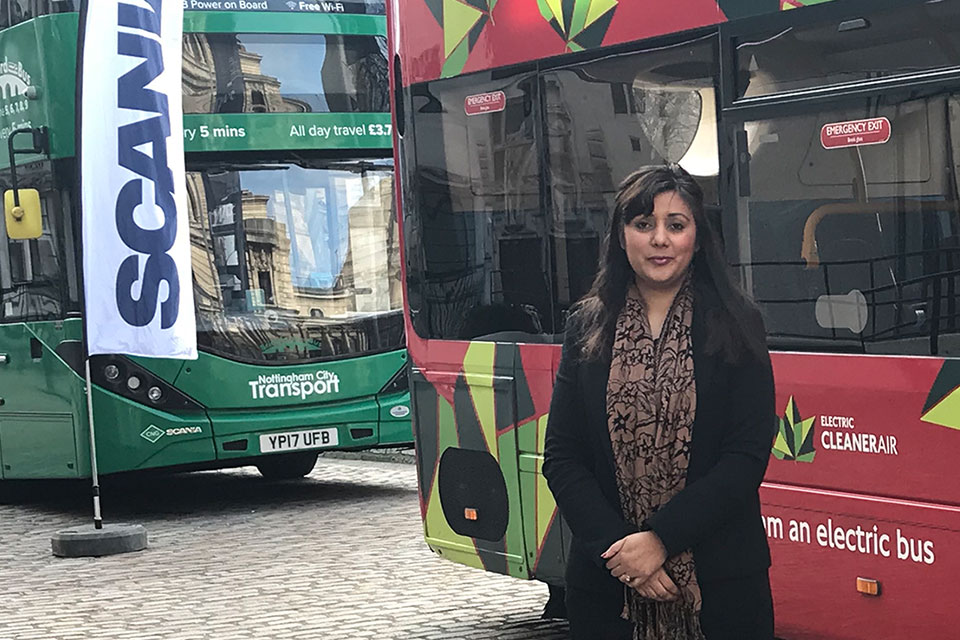Government funding boost for bus industry in drive to improve air quality
Councils across the country will benefit from a £40 million funding boost as part of a government drive to put more low emission buses on the roads.

Funding will be awarded to 20 local authorities as part of the Clean Bus Technology Fund, which was launched in 2017 and is run by the Joint Air Quality Unit.
Speaking at the UK Bus Summit at London’s QEII Centre on 8 February 2018, Transport Minister Nusrat Ghani set out how the money will enable older vehicles to meet minimum emissions standards, and contribute to better air quality.
Speaking at the Bus Summit, Transport Minister Nusrat Ghani said:
Buses and coaches are hugely important to those who rely on them and to the communities in which these people live and work.
Road transport is going to change dramatically over the next couple of decades – and we have to make sure that the bus industry is ready to benefit from those changes.
We have to move away from nose-to-tail car traffic at peak times, endless engine idling, stop-start travel and rising pollution and carbon emissions. Rather than contributing to the problem – buses and coaches very much form part of the solution.
The money will allow councils to retrofit vehicles with technology to reduce tailpipe emissions of nitrogen dioxide, as part of a drive to help ensure that more buses and coaches can contribute to improving air quality in UK cities.

Environment Minister Therese Coffey said:
Poor air quality affects public health, the economy and the environment, which is why we are determined to do more.
I am delighted to see so many high quality applications to the Clean Bus Technology Fund and, as a result, the government has decided to bring forward funding meaning that we will award nearly £40 million to retrofit more than 2,700 buses.
This is another way which the government is delivering on its commitment to improving the environment within a generation and leave it in a better state than we found it.
Alongside this, the Department for Transport will use the Bus Services Act as a way of encouraging councils and bus companies to look at measures to encourage the public to use buses.
In 2016, government invested £30 million through the Low Emission Bus Scheme, which helped put over 300 new low emission buses on the roads, with a further £11 million and 150 buses being announced in 2017.
Winners
| Clean Bus Technology Fund 2017 to 2019 winners | Number of buses | 2017/18 funding | 2018/19 funding |
|---|---|---|---|
| 1. West Yorkshire Combined Authority | 156 | £1,368,000 | £1,474,200 |
| 2. Bristol City Council | 81 | £1,047,800 | £1,167,000 |
| 3. Gateshead Metropolitan Borough Council | 79 | £828,000 | £674,180 |
| 4. Leeds City Council | 75 | £0 | £1,371,000 |
| 5. Transport for West Midlands | 364 | £1,500,000 | £1,500,000 |
| 6. Leicester City Council | 109 | £1,101,581 | £1,101,581 |
| 7. Oxford City Council | 83 | £938,910 | £724,020 |
| 8. Coventry City Council | 104 | £0 | £1,500,000 |
| 9. Nottinghamshire County Council | 112 | £1,373,265 | £0 |
| 10. Transport for Greater Manchester | 170 | £1,500,000 | £1,500,000 |
| 11. North Tyneside Council | 69 | £862,600 | £339,000 |
| 12. Nottingham City Council | 171 | £1,500,000 | £1,196,517 |
| 13. Transport for London | 500 | £1,500,000 | £1,500,000 |
| 14. Sheffield City Council | 117 | £560,000 | £1,386,800 |
| 15. Liverpool City Region Combined | 149 | £1,499,586 | £1,497,277 |
| 16. Southampton City Council | 145 | £1,177,835 | £1,500,000 |
| 17. Derby City Council | 152 | £1,500,000 | £798,330 |
| 18. Essex County Council | 60 | £1,072,500 | £0 |
| 19. South Tyneside Council | 29 | £232,500 | £252,000 |
| 20. Newcastle City Council | 43 | £180,000 | £510,000 |
| Totals | 2768 | £19,742,577 | £19,991,905 |
Further information
In November 2016 the Department for Transport announced a further £100 million to support low emission buses. Of this, £40 million was put towards the Clean Bus Technology Fund, and £60 million was dedicated to new low emission buses. From the £60 million, £11 million was used to fund the best of the bids which had initially narrowly missed out on funding from LEBS, supporting the purchase of a further 150 low emission buses. The remaining £49 million will be used to fund the next round of the Low Emission Bus Scheme.
By 15 September this year (2018), 5 local authorities are required to set out their final plans for bringing nitrogen dioxide concentrations within legal limits in the shortest possible time. A further 23 local authorities are required to set out their initial plans by the end of March, with final plans by the end of the year.
In August 2017, the Low Carbon Vehicle Partnership launched the Clean Vehicle Retrofit Accreditation Scheme, with government funding support.
Roads media enquiries
Media enquiries 0300 7777 878
Switchboard 0300 330 3000
Updates to this page
Published 8 February 2018Last updated 13 February 2018 + show all updates
-
First year funding figure for Southampton City Council corrected to £1,177,835.
-
First published.